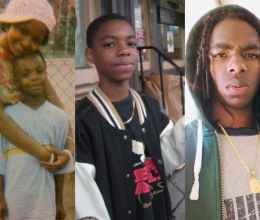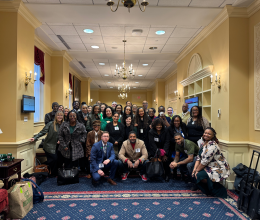UPDATE: On the week of June 29th, the state appeals court rebuked Judge Mickey Norman for improperly disregarding the emphatic verdict by the jury seeking to hold police accountable for the killing of Korryn Gaines. While we are pleased that the Maryland’s appeals court restored the Gaines family’s hard-won monetary verdict, we must continue forward towards holding police departments accountable for their officers deadly actions. With this victory, the jury’s verdict and the appeals court decision tell us BlackLivesDoMatter.
On the night of August 1, 2016, Baltimore County Police Officer Royce Ruby shot and killed 23-year old Korryn Gaines, in the process also critically wounding her son, five-year old Kodi Gaines, leaving the young child without a mother. What led up to this tragedy was a minor traffic violation.
When police arrived at the family’s apartment, no one answered. Instead of leaving, police improperly obtained a key from the landlord and entered without consent. Once inside, police found Korryn at home with a gun, and they initiated an hours-long “standoff.” Growing frustrated after seven hours, police disregarded the safety of both Kodi and Korryn, resorting to use of deadly force to try to execute the traffic warrant. Officer Ruby claimed that Korryn pointed a gun at him, prompting him to kill her. It later came to light that Korryn was shot in the back and Kodi was shot in his arm.
What led up to this tragedy was a minor traffic violation.
In keeping with what too-often happens with police killings of Black and Brown people, Baltimore County prosecutors and police ruled that the killing of Ms. Gaines and shooting of Kodi was justified. Authorities declined to prosecute Ruby or any of the officers involved, who got away with virtually no discipline. The family was left only with the option of a civil rights suit to hold police accountable. They sued Baltimore County, Ruby, and the involved officers for taking Korryn’s life and for shooting and terrorizing Kodi.
Judge Mickey J. Norman ruled that the decision about police responsibility was for a jury to decide. But when the jury found in favor of the child’s family, awarding $38 million in damages for their devastating loss, the police asked the judge to overturn the jury’s award. After a year of deliberation, the judge – himself a former police officer – reversed course on his prior ruling that liability was a matter for the jury, and substituted his own opinion, throwing out the jury’s verdict and finding police should be granted “qualified immunity.”
It is hard to bring a civil rights lawsuit against the government, because plaintiffs face daunting odds.
It is hard to bring a civil rights lawsuit against the government, because plaintiffs face daunting odds. Police officers typically stand together, giving credence to one another’s version of events. That dynamic was especially true in this case, where the only surviving witnesses were police themselves and a young child. On top of those barriers, the legal system has stacked up immunities from responsibility for police officials, increasing the burdens plaintiffs must overcome to win a police brutality case.
One of these immunities is “qualified immunity” which was originally created to protect individual government officials from baseless lawsuits so they can do their work and avoid personal liability for honest mistakes, unless they act unreasonably or knowingly violate the law. However, in practice, this immunity has transformed into a sword that the government wields against civil rights plaintiffs to prevent accountability for police wrongdoing, and to shelter police officers from consequences of their illegal acts, no matter how reckless or extreme. Police officers subjected to misconduct lawsuits almost always raise qualified immunity as a defense.
That is why Judge Norman’s initial rulings that Officer Ruby did not have legal immunity and that a jury should decide whether police acted illegally were highly significant. These rulings set the stage for a fairer trial in the Gaines case – letting each side put on its evidence and leaving it to the jury to decide whether police engaged in civil rights violations.
Over the course of a three-week trial, the Gaines family put on compelling evidence, disputing the police version of events, and showing that Korryn’s killing and Kodi’s injury were unlawful. After hearing all the evidence the jury deliberated and found that – contrary to government claims – Officer Ruby acted unreasonably and Korryn was needlessly killed. To compensate the family for their irreparable loss, the jury awarded $38 million in damages. While nothing can ever make up for the loss of a loved one through police abuse, the verdict sounded a ringing victory, over tremendous odds, for police accountability.
But then, Judge Norman threw it all out. Backtracking on his prior rulings that police had failed to establish their immunity defense, and that the case should be decided by the jury, Judge Norman reversed course. Faced with the jury’s emphatic judgment that police had done wrong, he decreed the jury couldn’t be trusted after all. He said police should get immunity and the Gaines family should get nothing.
Thankfully, Judge Norman may not have the last word. The Gaines family, with support from the ACLU of Maryland, appealed and that appeal is now pending in the Maryland Court of Special Appeals. Earlier this month, a three-judge panel heard oral arguments in the case, and voiced significant concerns about the appropriateness of Judge Norman’s override of the jury’s verdict.
To the public, the Judge Norman’s reversal showed that Korryn’s life – Black lives – don’t matter.
A decision from Maryland’s appeals court to restore the Gaines family’s hard-won jury verdict would be a small step forward on the long road toward establishing trust in our court system to police the police. To the public, the Judge Norman’s reversal showed that Korryn’s life – Black lives – don’t matter. All that matters is defending police. This is exactly the opposite of the jury’s message.
Slowly and together, we will get rid of police violence and eradicate the relentless, echoing message about the lack of value placed on Black lives.
Read the ACLU of Maryland’s amicus brief in the Gaines case here.




